|
Golden era of international relations:
Far-sighted foreign policy
Samangie Wettimuny
|
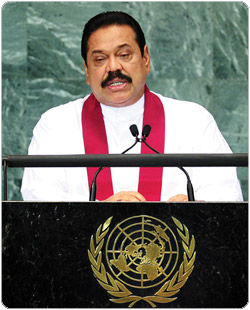
President Rajapaksa addressing the UN summit.
|
Mahinda Rajapaksa was elected as the
Fifth Executive President of Sri Lanka at a time the country was crying
out for a new and strong leadership. During his regime the country’s
foreign policy took a new course. The Foreign Policy of any country
should not be static, but be changed according to the needs of the time.
Generally it is believed that a Foreign Policy of a country should
promote and protect the national interest of a country. It is a set of
responses to external challenges and external opportunities.
The efforts made by the Rajapaksa Regime to resist unnecessary
international intervention and pursue timely, appropriate and
country-friendly policies always helped Sri Lanka to emerge from the
crisis with more robust performance than would otherwise have been
possible. President Rajapaksa showed the world that either the size or
the economic strength of a country is insignificant, if it is ruled by a
people-friendly leader who would not betray his motherland under any
adverse international influence.
The necessity of implementing international treaties and declarations
on anti-corruption was emphasized as such acts would enable the country
to act under the international law against those found guilty of
corruption when engaging in trade with foreign countries or foreign
institutions.
UN
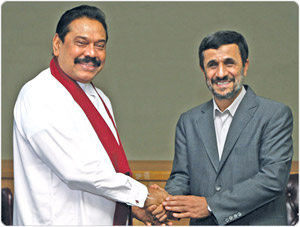
President Rajapaksa with Iranian President Mahmoud Ahmadinejad. |
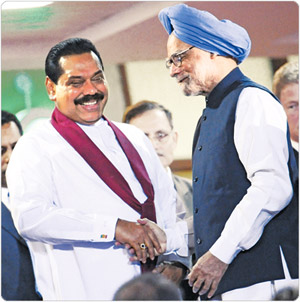
Strengthening ties with India – with Indian PM Dr Manmohan
Singh. |
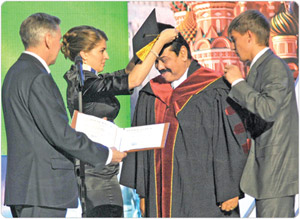
Honorary Doctorate for President Rajapaksa from the People’s
Friendship University of Russia. |
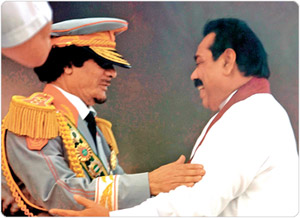
President Rajapaksa with Libyan leader Muammar Gaddafi. |
President Rajapaksa firmly believes that the United Nations
Organization and other Financial Institutions should be more democratic
in their approach. The speech he delivered at the UN General Assembly
last September also shows his stand on any International organization.
Leaders elected by people need the support of international community as
they usually face ‘difficult situations’ and at times they have to take
‘decisive decisions’ for the welfare of their citizens.
As he stated; “The results of their decisions must be evaluated
objectively and must be allowed to speak for themselves. That is not to
say countries should operate in isolation. In this globally
inter-dependent world, we must work together where we can and
constructively counsel each other where appropriate. The United Nations
forms the bed-rock of this interaction and in this role it will always
receive the support of Sri Lanka.’
‘Terrorism anywhere is terrorism’
The LTTE was always trying to tarnish the image of Sri Lanka through
false propaganda. Eminent Foreign Ministers such as late Lakshman
Kadirgamar played a significant role in rebuilding the image of the
country in the international arena. During Mahinda Rajapaksa’s tenure
this task was carried out even more prudently by sending high-level
diplomatic missions to various countries.
| "
A non-aligned foreign policy
I will continue Sri Lanka’s non-aligned
foreign policy. During the last four years we witnessed the
benefits of maintaining friendly relations with India, Japan,
China, Pakistan and other Asian 56 countries. I am committed to
continue these friendly relations in the political, economic,
defence, trade and cultural arena. I will ensure that Sri Lanka
abides by the global treaties and agreements on environmental
and climate change and will strengthen Sri Lanka’s ties with the
UN Agencies. I will maintain the dignity of my country in
foreign relations and will initiate a new programme to forge
relations with countries. " |
|
- Mahinda
Chinthana - Idiri Dakma” |
President Rajapaksa was unambiguously committed to defeat terrorism
in all its manifestations and was successful in driving his message home
that the LTTE had always been a terrorist organization and that they
never represented the Tamil community of Sri Lanka. It was emphasized
that what Sri Lanka had was a humanitarian operation to rescue the Tamil
community, not a racial one. In short President Rajapaksa stressed the
fact that “terrorism anywhere is terrorism.”
As analyzed by many academics, the prudent manner he handled ‘the
Indian factor’ was of tremendous use when defeating LTTE terrorism which
scourged the country for over thirty years. President Rajapaksa was
never motivated by personal factors when maintaining friendships with
foreign countries-particularly with India. India was always referred to
as ‘Sri Lanka’s elder brother.’
The country-friendly policy adopted by President Rajapaksa could earn
the good-will of India, thus enabling us to win the war despite the
pressure exerted by certain Western leaders, EU or the UN. The
high-level diplomatic missions undertaken by Minister Basil Rajapaksa
and Defence Secretary Gotabaya Rajapaksa played an important role in
winning over India. Rajapaksa regime maintained cordial relations with
Pakistan and China as well. As a result Sri Lanka could get military
support even from India’s rival Pakistan while being on friendly terms
with India.
India’s greatest competitor in the region, China too rose to the
occasion. China helped Sri Lanka tremendously both in terms of military
equipment and humanitarian aid. Recently China pledged even more aid to
Sri Lanka. The Chinese Prime Minister promised his country’s assistance
to develop infrastructure, particularly the highway network and bridges.
The government and the World Bank recently signed three project
agreements totaling US $ 125.4 million for Small and Medium Enterprise
Development, North East local service improvements, and sustainable
tourism development. All these achievements were possible due to Mahinda
Rajapaksa’s far-sighted foreign policy.
Under President Rajapaksa’s regime Sri Lanka established diplomatic
relations with many a nations, strengthening and fostering relations in
all their manifestations. He vowed to create a dignified Foreign Service
which has a correct awareness of Sri Lanka’s history, economic needs and
the cultural heritage. Official meetings with Iran President Mahmoud
Ahmedinejad, Libyan President Gadaffie, chairing regional and
international summits such as SAARC, G15, ACD addressing the UN summit
reinforced his ‘stature’ in the international arena. In recognition of
his services and strong political will, the People’s Friendship
University of Russia conferred a Doctorate on him. The request he made
from the Head of State of Portugal to return the artifacts the Portugese
took away from Sri Lanka during their rule was a clear manifestation of
his patriotism.
Role of advisor
Sri Lankan President was sought out for advice by foreign countries
such as Nepal and Maldives. In July, 2010 he arrived in Male to resolve
the political crisis of the then Maldivian government. Of late even the
President of Nepal has sought President’s help to find a solution to
overcome the political crisis in his country.
The Wall Street Journal (January 16, 2009) stated that: “For all
those who argue that there’s no military solution for terrorism we have
two words: Sri Lanka. Credit goes to the government of President Mahinda
Rajapaksa, who has made eliminating the Tigers a priority and invested
resources to make it happen. Military spending has surged to $1.7
billion for fiscal 2009, roughly 5 percent of GDP and nearly 20 percent
of the government’s budget.” Addressing the 62nd State Independence Day
Celebrations (the first Independence Day celebrations held after the
eradication of LTTE terrorism) on February 4, 2010, President Rajapaksa
stated specifically that in his foreign policy, whatever he has done was
in the interest of the people of Sri Lanka.
“Now the world should have a correct opinion about us. The Tiger
terrorism that impacted on other countries too has ended. The state of
war is now over.
We are entering into a new era of co-existence after finishing the
period of some controversy. I would like to say that we are now entering
the golden era of international relations.” |

